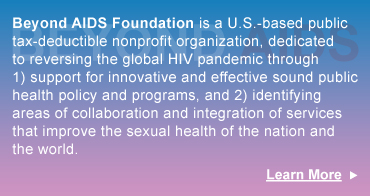Schwarzenegger Terminates Condoms for Inmates Bill
For Immediate Release Contact: Bart Broome
September 30, 2006
cell (415)203-7924
Governor Condemns 1000’s to HIV Infection with Veto of Condom Bill
Koretz cites loss of life and hundreds of millions in treatment costs
(Los Angeles) – AB 1677 authored by Assemblyman Paul Koretz (D-West Hollywood) was vetoed by Governor Arnold Schwarzenegger who refused to allow public health agencies to make condoms available to state prison inmates. The bill was sponsored by the Southern California HIV/AIDS Advocacy Coalition, AIDS Project Los Angeles, and AIDS Healthcare Foundation. AB 1677 would have enabled public health agencies to provide condoms to state prison inmates in order to control the spread of HIV/AIDS in communities outside of prison.
“The HIV infection rate in our state correctional facilities is many times higher than in the general population. With the average duration of incarceration being just 2 years, HIV infections in our state correctional facilities quickly spread to communities on the outside with high incarceration rates. Sadly, the Governor’s veto of condoms in prison will result in thousands of people both inside and outside of prison being infected with HIV at a staggeringly high cost in both human lives and taxpayer dollars,” said Assemblyman Koretz.
California prisons house over 162,083 individuals among whom the HIV infection rate is estimated to be eight times higher than in the general population of Los Angeles County. Studies show that between 40 and 60 percent of prison inmates engage in sexual activity while incarcerated. As is the case in most U.S. prison systems, condoms are considered contraband by the California Department of Corrections. Today, the leading cause of death for African American women age 25 to 34 is full blown AIDS, and many in public health see condom bans in American’s prisons as a significant source of HIV infections in the black community.
Mary Sylla is the Policy Director of Health Justice, a non-profit agency that over the last four years has distributed 14,000 condoms in the Los Angeles County Jail without incident. "Researchers are beginning to link the rise in HIV among African American women to the disproportionate number of African American men, their partners, who serve prison sentences. As Latinos have now become the predominant ethnic group in California’s prisons, a similar effect may be seen among that community and others unless our political leaders do the right thing and make condoms available to men in prison throughout the state.”
Former inmates who seroconvert in prison often end up on MediCal or in the AIDS Drug Assistance Program (ADAP). In the 2002-03 fiscal year, the average annual treatment cost for an HIV infected MediCal client was $22,964. The average annual cost for a client in ADAP was $7,966 in the 2003-04 fiscal year. The Department of Corrections can trace more than $20 million in annual spending on HIV related costs with the bulk of those funds going to pay for antiretroviral medication. State expenditures necessary to treat HIV infections occurring in prisons and subsequent infections in the general population likely totals in the hundreds of millions.
Condoms are available in prisons in the District of Columbia, Vermont, and Philadelphia as well as in Canada, South Africa, most of the European Union, and parts of Latin America. Among jail systems, New York City, Los Angeles, and San Francisco allow condoms for the incarcerated.
“Seventy percent of Californians support allowing condoms in prison because they recognize it will save lives and hundreds of millions of dollars in treatment costs. The Governor has chosen to ignore the common sense opinions of California voters as well as his primary responsibility to protect public health, in order to kowtow to a narrow group of his conservative supporters,” said Koretz.
###
Bart Broome
On Behalf of Former Assemblyman Paul Koretz
State Capitol
Sacramento, CA 95814
Tel 916-319-2042
Fax 916-319-2113
bart.broome@asm.ca.gov
![]() Return to Archived Articles and Letters
Return to Archived Articles and Letters

